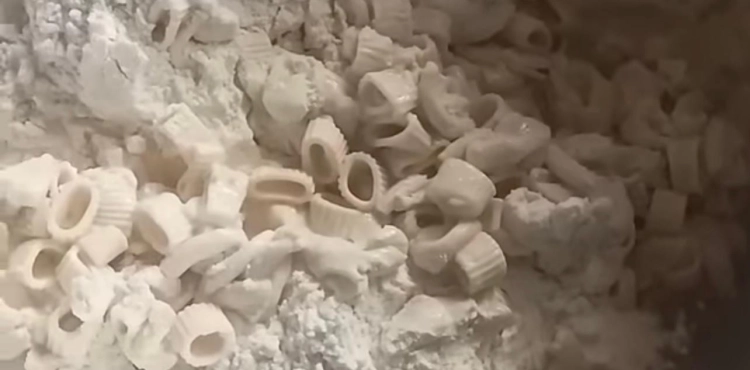In Gaza, pasta is no longer just a quick meal—it has become a harsh substitute for flour and a lifeline in a time of famine. In a place where hunger is the only thing freely given, women have resorted to inventive methods to create something that resembles bread—something to trick the stomach into believing it's been fed.
In Al-Nuseirat refugee camp, Umm Mohammad Al-Yaqubi, a woman in her thirties, sits on a worn-out piece of sponge in front of a tent that offers no protection from heat or cold. Before her, a pot of water swells with dry pasta she has soaked for 24 hours. She then grinds it by hand on a traditional sieve—“karbala”—turning it into something like flour. It's a scene that resembles not comfort, but survival—like escaping a shipwreck, only on dry land.
“We haven’t had flour for weeks,” Umm Mohammad says. “A bag of flour now costs over $300. We have no work, no income. We live off whatever tricks we can come up with.”
Pasta wasn’t the first alternative, but one of many desperate attempts mothers have made to feed their children. With wheat gone and bread a luxury beyond reach, imagination—and pasta—are all that remain.
She mixes the ground pasta with a little yeast, shapes the dough into flat discs with her calloused fingers, and bakes them on a metal sheet over a weak fire fueled by broken wood or furniture scraps.
“It doesn’t taste like bread,” she says, “but it fills the stomach a little. We tell the children it’s bread—and sometimes they believe us.”
Nearby, another woman (who preferred to remain anonymous) faces a different struggle. Without flour or pasta, she began collecting stale bread from neighbors, soaking and kneading it again, adding yeast and rebaking it.
“It doesn’t satisfy hunger,” she says, “but it silences it for a while.”
Now even that option is gone. “No one throws away bread anymore—everyone eats it. No one discards even crumbs.”
These aren’t symbolic tales—they are the harsh, daily reality for women in Gaza under a suffocating blockade that has now lasted over two months. Since Israel sealed off the crossings, essential goods have disappeared, food supplies have stopped, and humanitarian organizations have been unable to distribute flour or dry food. Prices have skyrocketed, and families have lost all purchasing power.
Gaza’s Ministry of Health has issued official warnings about the spread of malnutrition, particularly among children and the elderly. The human body can’t survive on crushed pasta, nor can the stomach digest half-formed dough.
In Gaza, baking bread is no longer just about nourishment—it has become a defiant act of survival.












